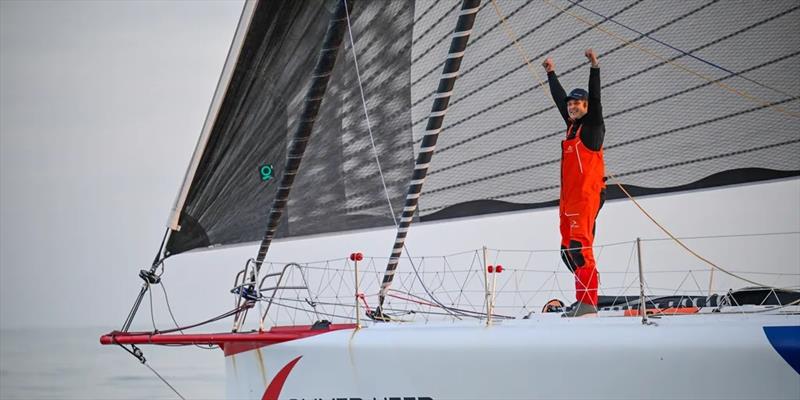
Oliver Heer finishes 29th in the Vendée Globe
by Vendée Globe media 17 Feb 19:21 GMT
18 February 2025

Oliver Heer finishes 29th in the Vendée Globe © Jean-Louis Carli / Alea
When he crossed the finish of the Vendée Globe solo non-stop race around the world this Monday afternoon off Les Sables d'Olonne at 1729 hrs UTC to secure 29th place overall, Swiss German solo racer Oliver Heer fulfilled a childhood dream, one which he has harboured since growing up sailing as a youngster on Lake Zurich.
But although he grew up with posters of his ocean racing idols on his wall it was only four years ago that he launched his own Vendée Globe project.
Following the premature death of his sailing mad father Heer was inspired to give up a burgeoning business career in the Far East to start professional sailing in England. He rose to become boat captain for British skipper Alex Thomson, a role he held during the last Vendée Globe.
Indeed it was during the delivery back from Cape Town early in 2021 on Thomson's freshly repaired IMOCA that he was actively encouraged by the two times Vendée Globe podium finisher to move on and take on the Vendée Globe in his own right. That conversation lit the blue touch paper and after a decidedly tough two year qualification process which saw the Swiss racer only just make the cut to be included in the 40 boat line up at the start, today Heer now completes an accomplished, steady race in a time of 99 days 05 hrs, 3 days hrs after 28th placed Antoine Cornic. In finishing the course he delivers on his sole, primary goal completing the course and thereby creates a track record that he now hopes to step up from and take on the next edition on a more competitive footing.
His race has been characterised by solid, disciplined seamanship, great determination and resilience and the technical skills - as befits a boat captain turned racer - to preserve his Farr designed 2007 generation in good shape. He was unlucky to be caught in calms several times, most notably losing touch with the boats in front of him when he was snared by light winds in the western Pacific, again in the South Atlantic and then made a strategic error approaching Rio which let Cornic and the group he was with escape. And since late December his attack has been compromised by a keel ram hydraulic issue which has meant he has not been able to cant his keel to port and so thereby not able to sail at max speed on port tack.
Heer made a good start but then - in something of a foretaste of the bad timing which was to mark his race - he hit a wind hold which his competitors slip away in front of him. He crossed the equator in 37th place after taking a two-hour penalty for a sail unloaded pre start after the authorized time cut off.
In the South Atlantic, the first major problem was a flooded engine, he damaged his mainsail before the keel ram issue appeared. As he rounded the Cape of Good Hope he celebrated his first Great Cape moment with a cigar and a sip of whisky, savouring his first real solo milestone. His Indian Ocean was unpredictable, exhausting, it shook up Tut Gut a lot. In the heart of the Pacific he saw an iceberg as he passed near Point Nemo. There, despite the light winds and cold, he started to relay his feelings about the enormity of the challenge he has taken on. Then comes Cape Horn an iconic landmark that he has dreamed of since his sailing trips on an Optimist on Lake Zurich and read about in all the ocean racing books and magazines he devoured as a youngster.
Heer long since proved his determination and resilience. After a collision with another IMOCA hours after the start of the 2022 Route du Rhum he had to stop into Lorient to make a significant composite repair. He restarted five days later and still went on to finish within the time limit to step up the qualification ladder. And earlier this year on the Transat CIC race from Lorient to New York he was knocked flat and suffered a full electronics failure which then required him to hand steer for many hours each day to ensure he finished the race which was an essential stepping stone to Vendée Globe qualification.
And so Heer completes a major personal achievement today, a fitting legacy to his late father and a reward for his sheer determination and will to succeed, always supported by his wife, family, friends, and a small, dedicated team, whilst bringing a new group of mainly Swiss German sponsors and fans with him on his remarkable journey from accomplished technician-boat captain to Vendée Globe finisher.
Race in figures:
- Arrival time (UTC): Monday 17 February 2025 at 17h29
- Race time: 99d 05h 27min 34s
- Difference from first 34d 10h 04min 45s
- Oliver Heer covered theoretical course of 23906 miles at an average speed of 10.04 knots.
- Oliver Heer covered an actual course of 27724 miles at an average speed of 11.64 knots.
Find out more...